英语双关语PPT
- 格式:ppt
- 大小:395.00 KB
- 文档页数:7

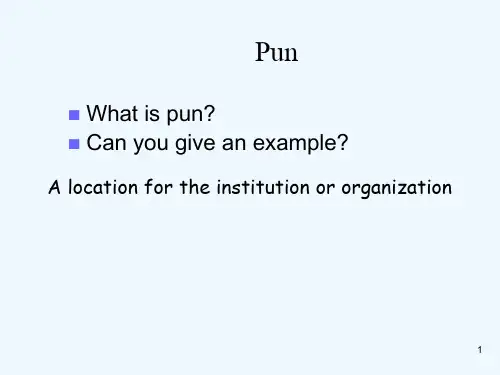


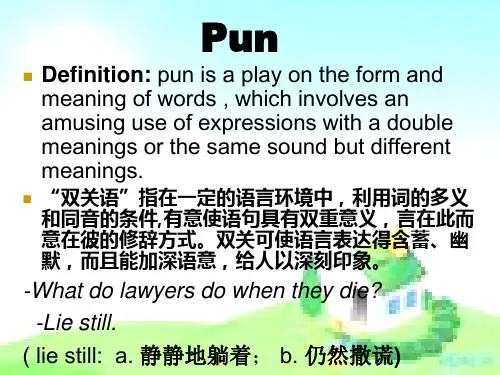
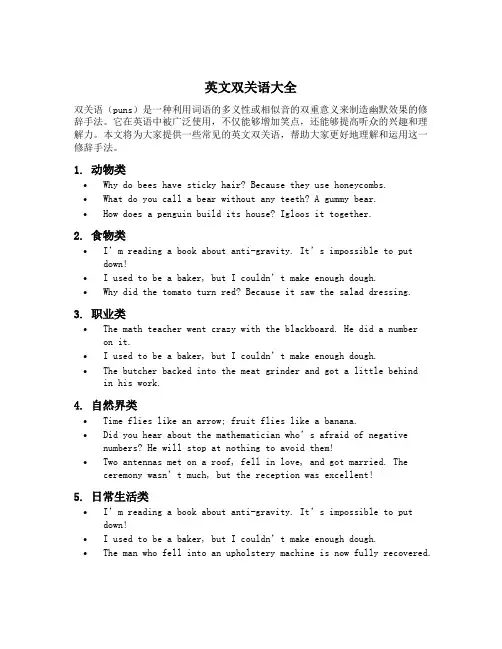
英文双关语大全双关语(puns)是一种利用词语的多义性或相似音的双重意义来制造幽默效果的修辞手法。
它在英语中被广泛使用,不仅能够增加笑点,还能够提高听众的兴趣和理解力。
本文将为大家提供一些常见的英文双关语,帮助大家更好地理解和运用这一修辞手法。
1. 动物类•Why do bees have sticky hair? Because they use honeycombs.•What do you call a bear without any teeth? A gummy bear.•How does a penguin build its house? Igloos it together.2. 食物类•I’m reading a book about anti-gravity. It’s impossible to put down!•I used to be a baker, but I couldn’t make enough dough.•Why did the tomato turn red? Because it saw the salad dressing.3. 职业类•The math teacher went crazy with the blackboard. He did a number on it.•I used to be a baker, but I couldn’t make enough dough.•The butcher backed into the meat grinder and got a little behind in his work.4. 自然界类•Time flies like an arrow; fruit flies like a banana.•Did you hear about the mathematician who’s afraid of negative numbers? He will stop at nothing to avoid them!•Two antennas met on a roof, fell in love, and got married. The ceremony wasn’t much, but the reception was excellent!5. 日常生活类•I’m re ading a book about anti-gravity. It’s impossible to put down!•I used to be a baker, but I couldn’t make enough dough.•The man who fell into an upholstery machine is now fully recovered.6. 健康类•The patient refused the nurse’s offer to draw his blood because he didn’t have any to spare.•Why did the scarecrow win an award? Because he was outstanding in his field!•Why don’t skeletons fight each other? They don’t have the guts.7. 爱情类•Time flies like an arrow; fruit flies like a banana.•Did you hear about the mathematician who’s afraid of negative numbers? He will stop at nothing to avoid them!•Two antennas met on a roof, fell in love, and got married. The ceremony wasn’t much, but the reception was excellent!8. 科学类•Why don’t scientists trust atoms? Because they make up everything!•I’m reading a book about anti-gravity. It’s impossible to put down!•The man who fell into an upholstery machine is now fully recovered.以上只是一部分常见的英文双关语,通过运用这些双关语,我们可以增加交流的乐趣,提高语言的表达力。
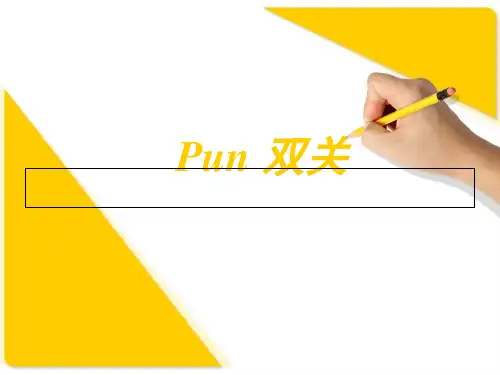
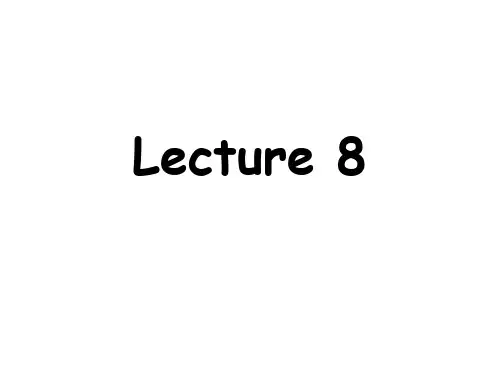
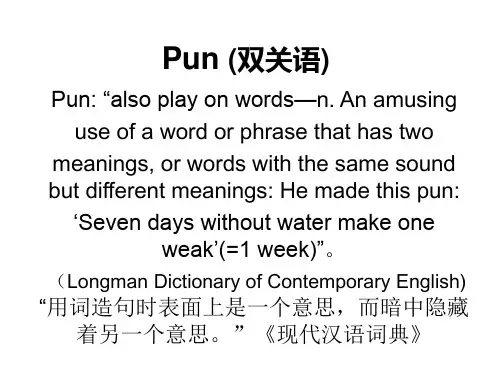
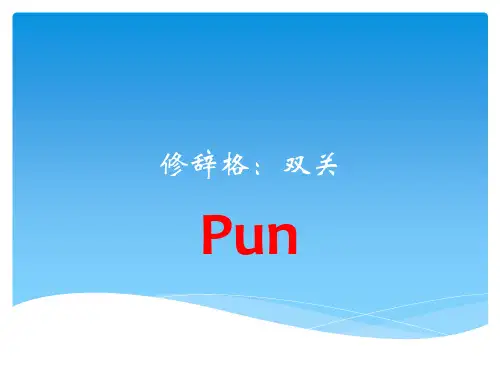
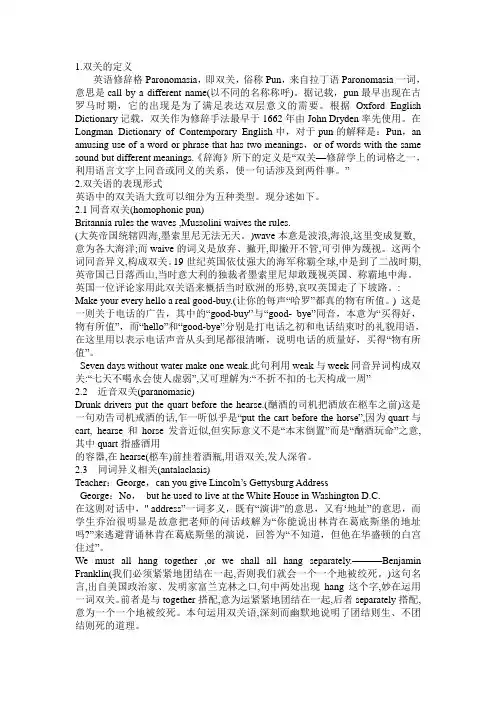
1.双关的定义英语修辞格Paronomasia,即双关,俗称Pun,来自拉丁语Paronomasia一词,意思是call by a different name(以不同的名称称呼)。
据记载,pun最早出现在古罗马时期,它的出现是为了满足表达双层意义的需要。
根据Oxford English Dictionary记载,双关作为修辞手法最早于1662年由John Dryden率先使用。
在Longman Dictionary of Contemporary English中,对于pun的解释是:Pun,an amusing use of a word or phrase that has two meanings,or of words with the same sound but different meanings.《辞海》所下的定义是“双关—修辞学上的词格之一,利用语言文字上同音或同义的关系,使一句话涉及到两件事。
”2.双关语的表现形式英语中的双关语大致可以细分为五种类型。
现分述如下。
2.1同音双关(homophonic pun)Britannia rules the waves ,Mussolini waives the rules.(大英帝国统辖四海,墨索里尼无法无天。
)wave本意是波浪,海浪,这里变成复数,意为各大海洋;而waive的词义是放弃、撇开,即撇开不管,可引伸为蔑视。
这两个词同音异义,构成双关。
19世纪英国依仗强大的海军称霸全球,中是到了二战时期,英帝国已日落西山,当时意大利的独裁者墨索里尼却敢蔑视英国、称霸地中海。
英国一位评论家用此双关语来概括当时欧洲的形势,哀叹英国走了下坡路。
: Make your every hello a real good-buy.(让你的每声“哈罗”都真的物有所值。
) 这是一则关于电话的广告,其中的“good-buy'’与“good- bye”同音,本意为“买得好,物有所值”,而“hello”和“good-bye”分别是打电话之初和电话结束时的礼貌用语,在这里用以表示电话声音从头到尾都很清晰,说明电话的质量好,买得“物有所值”。
话说英语的双关(ENGLISH PUN)双关语(pun)英语中一种常见的修辞手法。
该修辞格巧妙利用词的谐音、词的多义或歧义等,使同一句话可同时表达不同意义,以造成语言生动活泼、幽默诙谐或嘲弄讥讽的修辞效果,使人读来忍俊不禁、英语中双关语的构成通常需要两个基本条件,即双重情境(double context)和多义词或同音异义词。
其构成方式主要有以下四种:1)同音异义双关(谐音双关)指在一个语境中巧妙运用两个或多个词语的同音或谐音达到讽刺或具诙谐意味的效果。
eg 1. Seven days without water makes one weak.七天不进水,人就会虚弱。
weak和week是同音异义词。
因此这句话听起来可以理解为:Seven days without water makes one week.eg2. You earn your living and you urn your dead.生前劳碌奔命,死后化灰入土。
earn与urn(火化)同音异义,用在一起显得俏皮,别有趣味。
2)同词异义双关(多义词双关)指在同一语境中运用一个词语的两种意思巧妙地达到幽默风趣的效果,使读之别有韵味。
eg1. A: What's the longest sentence in the world?世上最长的句子是什么?B: Prison for life. 无期徒刑。
sentence既有“句子”的意思,也有“刑期”的含义。
eg2. Women have a wonderful sense of right and wrong, but little sense of right and left.女性对善恶感觉惊人,而对左右感觉麻木。
该句借用同词异义双关讽刺女性方向感差,开车左右不分。
eg3.We must all hang together, or we shall all hang se-parately. 我们必须团结一致,否则将一一被绞死。
pun英语双关语集锦课件.docPUN所谓pun,通常是指利用一个单词的两个含义,或者利用两个特定的单词,达到“一语双关”的目的。
双关语(pun)是英语中一种常见的修辞手法。
该修辞格巧妙利用词的谐音、词的多义或歧义等,使同一句话可同时表达不同意义,以造成语言生动活泼、幽默诙谐或嘲弄讥讽的修辞效果,使人读来忍俊不禁、英语中双关语的构成通常需要两个基本条件,即双重情境(double context )和多义词或同音异义词。
其构成方式主要有以下四种:1)同音异义双关(谐音双关)指在一个语境中巧妙运用两个或多个词语的同音或谐音达到讽刺或具诙谐意味的效果。
eg1. Seven days without water makes one weak.七天不进水,人就会虚弱。
weak 和week 是同音异义词。
因此这句话听起来可以理解为:Seven days without watermakes one week.eg2. You earn your living and you urn your dead.生前劳碌奔命,死后化灰入土。
earn 与urn(火化)同音异义,用在一起显得俏皮,别有趣味。
2)同词异义双关(多义词双关)指在同一语境中运用一个词语的两种意思巧妙地达到幽默风趣的效果,使读之别有韵味。
eg1. A: What's the longest sentence in the world?世上最长的句子是什么?B: Prison for life. 无期徒刑。
sentence既有“句子”的意思,也有“刑期”的含义。
eg2. Women have a wonderful sense of right and wrong, but little sense of right and left.女性对善恶感觉惊人,而对左右感觉麻木。
该句借用同词异义双关讽刺女性方向感差,开车左右不分。
eg3.We must all hang together, or we shall all hang se-parately. 我们必须团结一致,否则将一一被绞死。